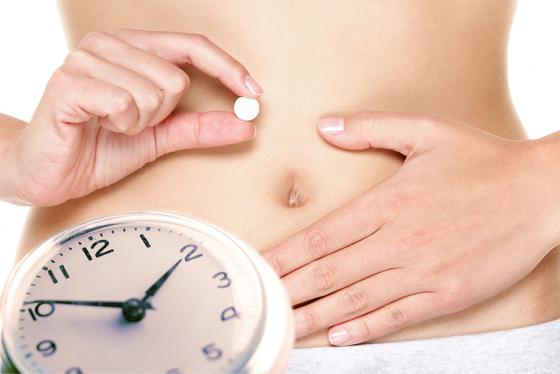Emergency contraception is a way of preventing pregnancy. If you had sex without using contraception, missed your pills, or if you had a contraceptive accident (such as a broken or slipped condom), call on your doctor or family planning advisor for emergency contraception to help you prevent an unwanted pregnancy. Emergency contraceptive methods must be used within 120 hours of unprotected sex. All emergency contraceptive methods are effective and safe for most women. If you are already pregnant, emergency contraception cannot cause abortion.
Emergency Contraceptive Pills (ECPs) must be taken within 72 or 120 hours of unprotected intercourse. A copper intra-uterine device (IUCD) must be inserted within 5 days of unprotected intercourse.
Emergency Contraceptive Pills
What are Emergency Contraceptive Pills (ECPs)?
There are two types of pills: progestogen-only pill or ulipristal acetate pill (a progesterone receptor modulator). Comparison between two types of pills are as follows:
| Progestogen only | Ulipristal acetate | |
| When should I take it? | Up to 72 hours after unprotected intercourse | Up to 120 hours after unprotected intercourse |
| Failure rate | 2-3% | 1-2% |
| Will the intake time affect drug efficacy? | Efficacy decreases with time | Same efficacy within 120 hours |
| Side effects | Headache, nausea, dizziness, fatigue, dysmenorrhea, abdominal pain, back pain and breast tenderness | |
| Any effect on the fetus in case ECP fails? | No adverse effect | Little data |
| I am breastfeeding, can I use it? | Yes | No breastfeeding for 7 days after drug use |
| Can I use hormonal contraception within the same cycle? | Yes, efficacy of hormonal contraception is not affected | No, efficacy of hormonal contraception is reduced |
| Special precaution | Concomitant use of progestogen only and ulipristal acetate within the same cycle is not recommended | |
How do ECPs work?
ECPs will either stop or delay the release of an ovum or prevent fertilization. Pregnancy occurs only after the implantation. Once this has happened, ECPs are no longer effective and will not induce an abortion.
How effective are ECPs?
ECPs prevent most pregnancies but they are not 100% effective. The treatment fails in approximately 2% of women using ECPs correctly. If a woman used ECPs frequently, her chance of becoming pregnant would be much higher than if she used regular contraceptives. This is why ECPs are not a substitute for regular contraceptives.
Important: Emergency contraceptive pills can only prevent pregnancy after single unprotected intercourse and there is no further protection if you have subsequent unprotected intercourse. Use a regular contraceptive method to prevent pregnancy in the future.
Are ECPs safe?
ECPs should be prescribed by a health care provider. Most women can use ECPs safely. Health care providers have safely prescribed ECPs since the mid-1970s. You should consult your health care provider before using ECPs to find out whether there is any reason you cannot use them.
Do ECPs cause side effects?
Sometimes ECPs can cause headaches, nausea, dizziness, fatigue, dysmenorrhea, abdominal pain, back pain or breast tenderness. These side effects generally do not last for more than 24 hours.
What should I do after using ECPs?
You will not see any immediate signs showing whether or not the ECPs worked. Your menstrual period should come on time or a few days early or late. If your period is more than a week later than expected, or if you have any cause for concern, see your health care provider.
If the ECPs do not work, and I become pregnant, will the pregnancy be normal?
Based on available information, there is no reason to believe that the pregnancy would be abnormal or the baby would be hurt by using progestogen-only pill. However, extremely limited data are available on the health of the fetus / newborn after ulipristal acetate exposure.
How do I use ECPs?
The progestogen-only ECP offered by the Association is a single-dose packaging, and it has to be taken within 72 hours of unprotected intercourse, the earlier the better. The ulipristal acetate is also a single tablet, which has to be taken within 120 hours.
For Emergency Use Only
Emergency Contraceptives should not be used routinely to prevent pregnancy as it is less effective than the regular contraceptives (pills, injectables, IUCDs, sterilization, etc.). You should consult your health care provider who can help you choose a method that suits you best.

Other Emergency Contraceptive Methods: Copper "T" Intra-uterine Device (IUCD)
A copper "T" IUCD can be inserted by a trained health care provider within 5 days of unprotected sex to prevent pregnancy. This method is very effective with failure rate of 0.09%.
It may cause lower abdominal pain and vaginal bleeding after insertion. Your next period should come at the expected time, but the flow may be heavier and with more pain. These side effects usually subside within first three months.
Because an "emergency" IUCD can be used for many years as a regular contraceptive, it may be an option for women who want long-lasting contraceptive protection and who are suitable for the IUCD.

Emergency Contraception and Sexually Transmissible Diseases
ECPs and the IUD do not protect against AIDS and other sexually transmissible diseases. If you are worried about whether you may have been infected with AIDS or other sexually transmissible diseases, consult your health care provider about further tests.






